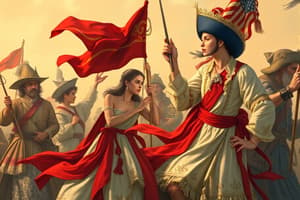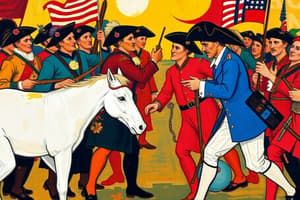Podcast
Questions and Answers
What was the primary purpose of the Committee of Correspondence?
What was the primary purpose of the Committee of Correspondence?
- To facilitate the import of British goods
- To communicate about British laws and organize resistance (correct)
- To organize local militia groups
- To promote trade with Britain
Which law required a tax on paper items such as legal documents and newspapers?
Which law required a tax on paper items such as legal documents and newspapers?
- Stamp Act of 1765 (correct)
- Sugar Act of 1764
- Declaratory Act
- Townshend Acts
What event is referred to as the Boston Massacre?
What event is referred to as the Boston Massacre?
- A protest against the Stamp Act
- The Boston Tea Party
- A violent confrontation between British soldiers and colonists resulting in deaths (correct)
- An attack on British officials in Boston
What was the result of the Tea Act of 1773?
What was the result of the Tea Act of 1773?
What was the significance of the Intolerable Acts?
What was the significance of the Intolerable Acts?
Who were the Patriots during the Revolution?
Who were the Patriots during the Revolution?
What did the First Continental Congress urge the colonies to do?
What did the First Continental Congress urge the colonies to do?
What was the role of the Sons of Liberty?
What was the role of the Sons of Liberty?
What was the Quartering Act intended to accomplish?
What was the Quartering Act intended to accomplish?
What was the outcome of the Boston Tea Party?
What was the outcome of the Boston Tea Party?
What was the name given to the American army during the Revolution?
What was the name given to the American army during the Revolution?
Who was appointed as the commander of all American forces?
Who was appointed as the commander of all American forces?
Which battle is associated with heavy British casualties totaling 1,100 men?
Which battle is associated with heavy British casualties totaling 1,100 men?
Who was the primary author of the Declaration of Independence?
Who was the primary author of the Declaration of Independence?
What event is characterized by George Washington's surprise attack on German mercenaries?
What event is characterized by George Washington's surprise attack on German mercenaries?
Which individual is known for training American troops in military drills?
Which individual is known for training American troops in military drills?
What was the outcome of the Battle of Saratoga?
What was the outcome of the Battle of Saratoga?
Which American is known for his naval raids and capturing the Serapis?
Which American is known for his naval raids and capturing the Serapis?
What was the significance of Valley Forge during the American Revolution?
What was the significance of Valley Forge during the American Revolution?
What term describes individuals who remained loyal to the king and Parliament during the Revolution?
What term describes individuals who remained loyal to the king and Parliament during the Revolution?
What was the main purpose of the Sugar Act of 1764?
What was the main purpose of the Sugar Act of 1764?
Which act allowed tax collectors to search for smuggled goods without much restriction?
Which act allowed tax collectors to search for smuggled goods without much restriction?
What was a consequence of the Intolerable Acts for the city of Boston?
What was a consequence of the Intolerable Acts for the city of Boston?
Which group was known to sometimes use violence to intimidate British tax collectors?
Which group was known to sometimes use violence to intimidate British tax collectors?
What event resulted from colonists dumping tea into Boston Harbor?
What event resulted from colonists dumping tea into Boston Harbor?
Which of the following describes the role of a 'Minuteman' in colonial times?
Which of the following describes the role of a 'Minuteman' in colonial times?
What was the British response to the Boston Massacre incident?
What was the British response to the Boston Massacre incident?
What did the First Continental Congress NOT request from King George?
What did the First Continental Congress NOT request from King George?
Which act required colonial Americans to house British soldiers?
Which act required colonial Americans to house British soldiers?
Who were referred to as 'Redcoats' during the American Revolution?
Who were referred to as 'Redcoats' during the American Revolution?
What was the outcome of the Battle of Bunker Hill?
What was the outcome of the Battle of Bunker Hill?
Who was responsible for transforming the American army into an effective fighting force?
Who was responsible for transforming the American army into an effective fighting force?
Which battle resulted in a significant surrender of British troops on October 19, 1781?
Which battle resulted in a significant surrender of British troops on October 19, 1781?
What document outlined the American grievances against the king?
What document outlined the American grievances against the king?
Which individual played a significant role in the American naval efforts during the Revolution?
Which individual played a significant role in the American naval efforts during the Revolution?
What was the primary role of the Second Continental Congress during the Revolution?
What was the primary role of the Second Continental Congress during the Revolution?
Which battle demonstrated the effectiveness of guerrilla tactics led by a certain American commander?
Which battle demonstrated the effectiveness of guerrilla tactics led by a certain American commander?
What significant event took place on Christmas night, 1776?
What significant event took place on Christmas night, 1776?
What was the harsh winter encampment for the American army from 1777 to 1778 called?
What was the harsh winter encampment for the American army from 1777 to 1778 called?
Which term best describes individuals who remained loyal to the British crown during the Revolution?
Which term best describes individuals who remained loyal to the British crown during the Revolution?
Flashcards
Sons of Liberty
Sons of Liberty
A group of colonists who used violence to intimidate tax collectors and opposed British laws, particularly the Stamp Act.
Stamp Act
Stamp Act
A tax law requiring colonists to pay a tax on paper items, like legal documents and newspapers.
Committee of Correspondence
Committee of Correspondence
This group of colonial representatives from different towns and colonies worked together to spread information and coordinate resistance to new British laws. They used letters to communicate and organize.
Declaratory Act
Declaratory Act
Signup and view all the flashcards
Townshend Acts
Townshend Acts
Signup and view all the flashcards
Boston Massacre
Boston Massacre
Signup and view all the flashcards
The Tea Act
The Tea Act
Signup and view all the flashcards
Intolerable Acts
Intolerable Acts
Signup and view all the flashcards
First Continental Congress
First Continental Congress
Signup and view all the flashcards
Minutemen
Minutemen
Signup and view all the flashcards
Battle of Lexington and Concord
Battle of Lexington and Concord
Signup and view all the flashcards
Continental Army
Continental Army
Signup and view all the flashcards
Second Continental Congress
Second Continental Congress
Signup and view all the flashcards
George Washington
George Washington
Signup and view all the flashcards
Battle of Bunker Hill
Battle of Bunker Hill
Signup and view all the flashcards
Thomas Jefferson
Thomas Jefferson
Signup and view all the flashcards
Declaration of Independence
Declaration of Independence
Signup and view all the flashcards
Loyalists
Loyalists
Signup and view all the flashcards
Battle of Trenton
Battle of Trenton
Signup and view all the flashcards
Battle of Saratoga
Battle of Saratoga
Signup and view all the flashcards
Baron Von Steuben
Baron Von Steuben
Signup and view all the flashcards
Marquis de Lafayette
Marquis de Lafayette
Signup and view all the flashcards
John Paul Jones
John Paul Jones
Signup and view all the flashcards
Valley Forge
Valley Forge
Signup and view all the flashcards
Francis Marion
Francis Marion
Signup and view all the flashcards
Battle of Yorktown
Battle of Yorktown
Signup and view all the flashcards
Yorktown Surrender
Yorktown Surrender
Signup and view all the flashcards
Stamp Act of 1765
Stamp Act of 1765
Signup and view all the flashcards
The Townshend Acts
The Townshend Acts
Signup and view all the flashcards
The Boston Massacre
The Boston Massacre
Signup and view all the flashcards
The Tea Act of 1773
The Tea Act of 1773
Signup and view all the flashcards
The Boston Tea Party
The Boston Tea Party
Signup and view all the flashcards
The Intolerable Acts
The Intolerable Acts
Signup and view all the flashcards
The Quartering Act
The Quartering Act
Signup and view all the flashcards
Study Notes
American Revolution Review
-
Committee of Correspondence: A method of communication between towns and colonies to challenge British laws.
-
Sugar Act of 1764: Taxed molasses and sugar imported by colonists. Accused smugglers faced trials in Britain.
-
Stamp Act of 1765: Required colonists to pay tax on paper items, including legal documents and newspapers.
-
Sons of Liberty: A group sometimes using violence to intimidate tax collectors. Many colonial courts closed due to refusal to buy required stamps.
-
Declaratory Act: Stated Parliament's power to make laws for the colonies.
-
Townshend Acts: Placed duties on lead, paper, paints, glass, and tea. British officials used writs of assistance to search for smuggled goods. Took power from colonial governments.
-
Boston Massacre (1770): A British soldier's argument with a colonist escalated, resulting in a crowd throwing snowballs and shouting insults. Five colonists were shot and killed.
-
The Boston Tea Party (1773): Colonists disguised as Native Americans dumped 342 chests of tea into Boston Harbor to protest the Tea Act.
-
Intolerable Acts: Closed Boston Harbor, canceled Massachusetts' charter, controlled legislature meetings, and sent royal officials to Britain for trial.
-
Quartering Act: Required colonists to house British soldiers.
-
First Continental Congress: Congress encouraged boycotts of British goods, urged preparation for war, asked the King to protect the rights of colonists.
-
Patriots: Colonists who supported independence.
-
Minutemen: Colonial militia units, ready at a minute's notice.
-
Redcoats: British Soldiers.
-
Battle of Lexington (1775): A brief battle resulting in casualties for both sides.
-
Battle of Bunker Hill (1775): A battle where the British lost many troops.
-
Declaration of Independence: Outlined reasons for independence from Britain, written primarily by Thomas Jefferson.
-
Loyalists: Individuals loyal to the King and Parliament.
-
Battle of Trenton (1776): A surprise attack by Washington and his troops on Christmas night, with casualties to German mercenaries.
-
Battle of Saratoga (1777): Led to the surrender of a large British army, contributing to American victory. This victory convinced France to support the US.
-
Valley Forge (1777-1778): A harsh winter encampment for the Continental Army where thousands died due to lack of supplies.
-
Swamp Fox (Francis Marion): A guerilla soldier who used surprise attacks to disrupt British communication and supply lines. (Nickname).
-
Siege of Yorktown (1781): Cornwallis surrendered to Washington, leading to an important American victory.
-
Treaty of Paris (1783): Ended the Revolutionary War; Britain recognized American independence. Established the borders for the newly formed US.
-
Baron Von Steuben: Helped train the Continental Army
-
Marquis de Lafayette: A French nobleman who served in the Continental Army without pay.
-
John Paul Jones: An American naval commander who raided British towns.
Studying That Suits You
Use AI to generate personalized quizzes and flashcards to suit your learning preferences.




